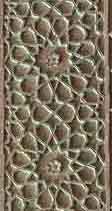REQUIRED
WORK:
*Barbara D.
and Thomas
R. Metcalf, "The Crisis of the Colonial Order: Reform, Disillusionment,
and Division, 1919-1939," and "The 1940's: Triumph and Tragedy," A
Concise
History of India, Chapters 6 (pp. 165-199) and 7 (pp. 200-226)
*Sir
Muhammad Iqbal, "Presidential
address to the 25th Session of the All-India Muslim League,"
December
29, 1930, Sections 1-4 and 10: online
at CU. A concise introduction to Iqbal himself, by Khushwant Singh:
online
at CU.
*Akbar S.
Ahmed, "The
Search for Saladin," in Jinnah, Pakistan and Islamic
Identity (London:
Routledge, 1997), Chapter One: on
the CU website.
*Rajmohan
Gandhi, "Conclusion,"
in Eight Lives: A Study of the Hindu-Muslim Encounter (Albany:
SUNY
Press, 1986), Chapter 10, pp. 311-318: these
pages on the CU website. Also: whole book online
through NetLibrary. Once within their system, you can go to the exact
location.
*Muhammad
Ali Jinnah,"Presidential
Address to the Constituent Assembly of Pakistan," August 11, 1947: on
the CU website.
*Sa'adat
Hasan Manto, "Toba
Tek Singh." online
at CU.
*Dr. Zakir
Husain, "A
Day in August, 1947." From Outlook India, Oct. 29, 2004. C.
M. Naim, trans.: on
the Outlook website; also online
at CU.
POSSIBLE
PAPER TOPIC ELEVEN:
In The
Reconstruction
of Religious Thought in Islam, Iqbal tries mightily to reshape his
religion along new lines. Consider any chapter you like. Iqbal's
erudition
is formidable, of course. Explain the main lines of his argument in
your
chosen chapter. Do you find it compelling? If you wanted to argue
against
him, how would you frame your own argument, and what weak points in his
approach would you emphasize? Source: The Reconstruction of
Religious
Thought in Islam (1930) (London: Oxford University Press, 1934) on
BUTLER RESERVE. Also, the whole text, annotated by later editors, is
online
both at allamaiqbal.com
and at tolueislam.com.



